EEIST
Foreword
first supported the deployment of offshore wind, it generated around three times the market price. Few people guessed that within a would fall by 70 per cent, allowing offshore wind to provide electricity market price.
aimed to deploy 20 GW of offshore wind in the UK by 2030. With the announcement last year
Ten Point Plan for a Green Industrial Revolution, we doubled that target to 40 GW by 2030 –every home in the country. Meanwhile, the number of high-quality jobs supported by the industry and continues to grow.
that progress in clean technologies has been faster than expected. The amount of solar power 2020 was over ten times higher than experts had forecast only fifteen years before. Similarly, the share of electric vehicles in global car sales continue to be revised radically upward. As we of the Paris Agreement within reach, and to maximise the benefits of the transition to net zero that we learn the lessons of these successes.
Government issued new guidance on policy appraisal in contexts of transformational change. This the future is uncertain, the aim of analysis is less to predict outcomes precisely, and more to find – places where a small intervention can have a large effect. I am delighted that researchers from and Brazil are working together to deepen our understanding of where such leverage points for change can be found, and to apply this to addressing climate change and ecosystem degradation, our challenge.
Energy Agency has estimated that without international collaboration, the transition to net zero global delayed by decades. On the other hand, if we work together, we can innovate faster, realise larger and create stronger incentives for investment. As countries of the world come together at COP26, this positive vision. With determined action and sustained collaboration, we can create new opportunities while securing a safe climate for the future.
ENABLING A MORE RAPID AND EQUITABLE ENERGY TRANSITION
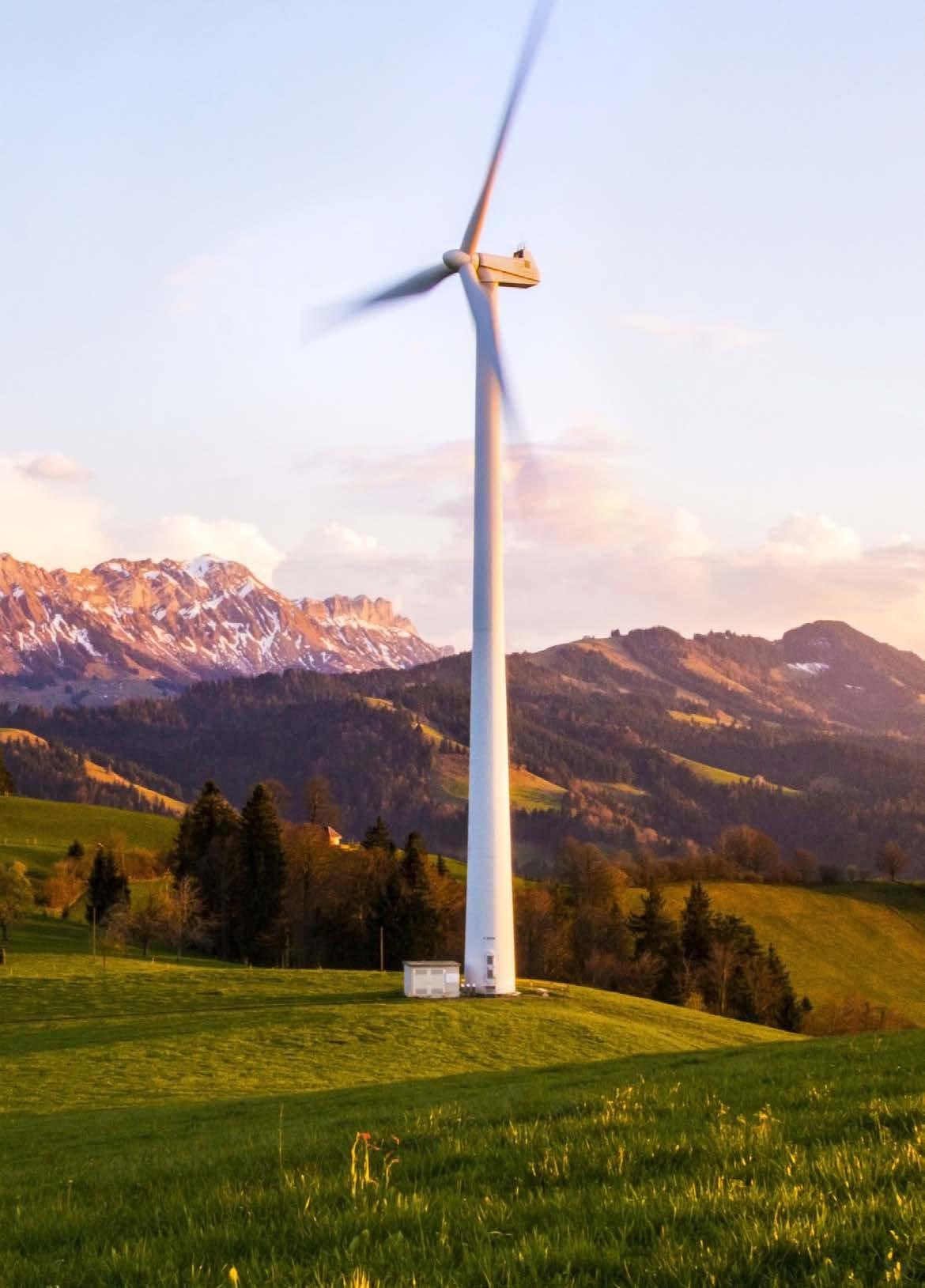
A SUMMARY OF THE ECONOMICS OF ENERGY INNOVATION AND SYSTEM TRANSITION
Nick Bridge
Foreign Secretary's Special Representative for Climate Change Foreign, Commonwealth & Development Office
Introduction – What is EEIST?
The problem
The world needs to transition to a clean economy five times faster to meet global climate targets and avoid dangerous levels of warming.
The solution
The Economics of Energy Innovation and System Transition is a three-year project from a consortium of institutions which is funded by the UK Government and CIFF, the Children’s Investment Fund Foundation. By developing new economic models, the project intends to support a step-change in thinking on the economics of the energy transition, which will in turn support more ambitious and effective policy.
Aims of the EEIST Project
The project develops analysis in the shape of tailored models which answer specific policy questions that support government decision making around low-carbon innovation and technological change. By engaging with policymakers and stakeholders in Brazil, China, India, the UK and the EU, the project aims to contribute to the economic development of emerging nations and support sustainable development globally.
2
The consortium
Foreword first supported the deployment of offshore wind, it generated around three times the market price. Few people guessed that within a would fall by 70 per cent, allowing offshore wind to provide electricity market price.
The creation of Communities of Practice
Led by the University of Exeter, EEIST brings together an international team of world-leading research institutions across Brazil, China, India, the UK and the EU.
The consortium of institutions are:
aimed to deploy 20 GW of offshore wind in the UK by 2030. With the announcement last year Ten Point Plan for a Green Industrial Revolution, we doubled that target to 40 GW by 2030 –every home in the country. Meanwhile, the number of high-quality jobs supported by the industry and continues to grow.
UK: University of Exeter, University of Oxford, University of Cambridge, University College London, Anglia Ruskin University, Cambridge Econometrics, Climate Strategies.
The EEIST project has worked hard with national, regional and local societies including stakeholders and governments in emerging economies in Brazil, China and India to create ‘Communities of Practice’ which act as knowledge transfer hubs. These hubs have helped offer bespoke answers to specific policy questions, which vary from country to country.
that progress in clean technologies has been faster than expected. The amount of solar power 2020 was over ten times higher than experts had forecast only fifteen years before. Similarly, the share of electric vehicles in global car sales continue to be revised radically upward. As we of the Paris Agreement within reach, and to maximise the benefits of the transition to net zero that we learn the lessons of these successes.
India: The Energy and Resources Institute, World Resources Institute.
China: Beijing Normal University, Tsinghua University, Energy Research Institute.
Brazil: Federal University of Rio de Janeiro, University of Brasilia, Universidade Estadual de Campinas (UNICAMP).
The models challenge much of the economic status quo. They suggest the transition will save us money and can be good for growth and jobs. EEIST has developed a wealth of case studies in different sectors in emerging economies that show how new models of the transition can inform key decisions.
Government issued new guidance on policy appraisal in contexts of transformational change. This the future is uncertain, the aim of analysis is less to predict outcomes precisely, and more to find – places where a small intervention can have a large effect. I am delighted that researchers from and Brazil are working together to deepen our understanding of where such leverage points for change can be found, and to apply this to addressing climate change and ecosystem degradation, our challenge.
EU: Scuola Superiore di Studi Universitari e di Perfezionamento Sant’Anna.
Please read on for an overview of the EEIST project’s major reports over the last three years.
Energy Agency has estimated that without international collaboration, the transition to net zero global delayed by decades. On the other hand, if we work together, we can innovate faster, realise larger and create stronger incentives for investment. As countries of the world come together at COP26, this positive vision. With determined action and sustained collaboration, we can create new opportunities while securing a safe climate for the future.
For full institutional affiliations see the back cover or visit eeist.co.uk
Nick Bridge Foreign Secretary's Special Representative for Climate
Foreign, Commonwealth & Development Office
3
Change
EEIST’s findings
The EEIST project has produced three major reports over the last three years:
2021
EEIST’s first report, ‘The new economics of innovation and transition: evaluating opportunities and risks’, shows how policies critical to the most outstanding successes so far in low-carbon transitions in China, India, Brazil, the UK and EU were generally implemented ‘despite, not because of, the predominant economic analysis and advice’.

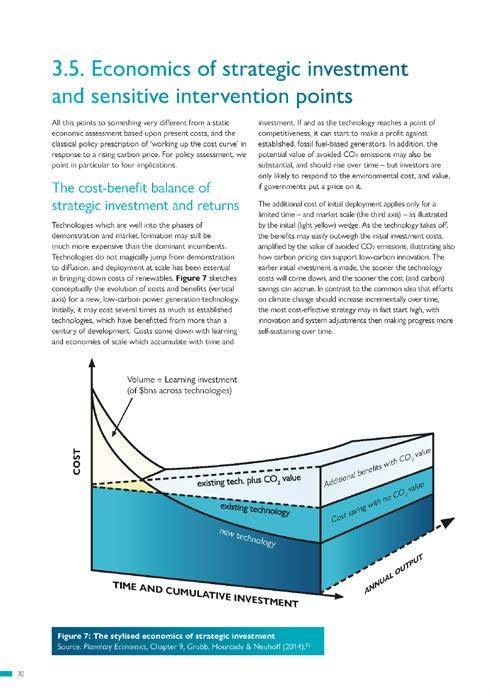
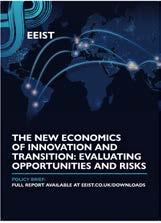
4
Foreword
first supported the deployment of offshore wind, it generated around three times the market price. Few people guessed that within a would fall by 70 per cent, allowing offshore wind to provide electricity market price.
2022
The second report, ‘Ten principles for policymaking in the energy transition: lessons from experience’, offers governments new methods to use policy to accelerate clean technology transitions to drive action on climate goals.

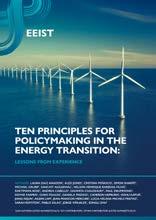
aimed to deploy 20 GW of offshore wind in the UK by 2030. With the announcement last year Ten Point Plan for a Green Industrial Revolution, we doubled that target to 40 GW by 2030 –every home in the country. Meanwhile, the number of high-quality jobs supported by the industry and continues to grow.
that progress in clean technologies has been faster than expected. The amount of solar power 2020 was over ten times higher than experts had forecast only fifteen years before. Similarly, the share of electric vehicles in global car sales continue to be revised radically upward. As we of the Paris Agreement within reach, and to maximise the benefits of the transition to net zero that we learn the lessons of these successes.
Government issued new guidance on policy appraisal in contexts of transformational change. This the future is uncertain, the aim of analysis is less to predict outcomes precisely, and more to find – places where a small intervention can have a large effect. I am delighted that researchers from and Brazil are working together to deepen our understanding of where such leverage points for change can be found, and to apply this to addressing climate change and ecosystem degradation, our challenge.
Energy Agency has estimated that without international collaboration, the transition to net zero global delayed by decades. On the other hand, if we work together, we can innovate faster, realise larger and create stronger incentives for investment. As countries of the world come together at COP26, this positive vision. With determined action and sustained collaboration, we can create new opportunities while securing a safe climate for the future.
Nick Bridge
Foreign Secretary's Special Representative for Climate Change Foreign, Commonwealth & Development Office
Invest and regulate Ensure a just transition De-risk markets Understand bias Consider opportunity and risk Grow global markets Choose technologies deliberately Target tipping points Ten Principles for Policymaking in the Energy Transition £ £ Be adaptive Combine policies 5
2023
EEIST’s third report, ‘New economic models of energy innovation and transition: addressing new questions and providing better answers’, provides a treasure chest of real-life examples from EEIST’s global network of partners that show how this new economic modelling has worked to inform timely policy questions, and how it can work in the future to save trillions of dollars.
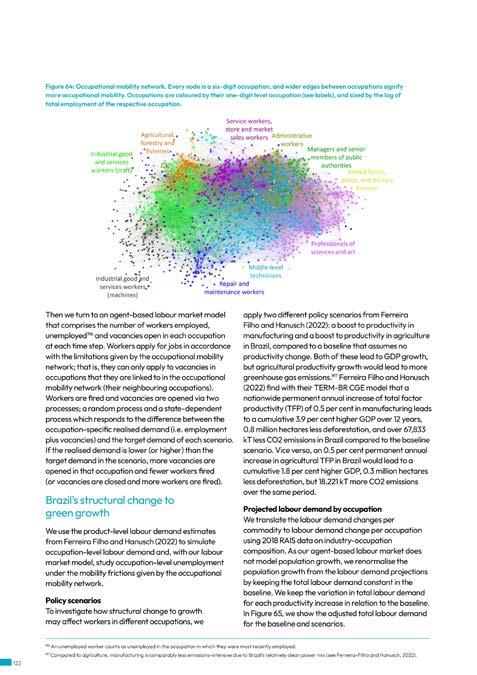
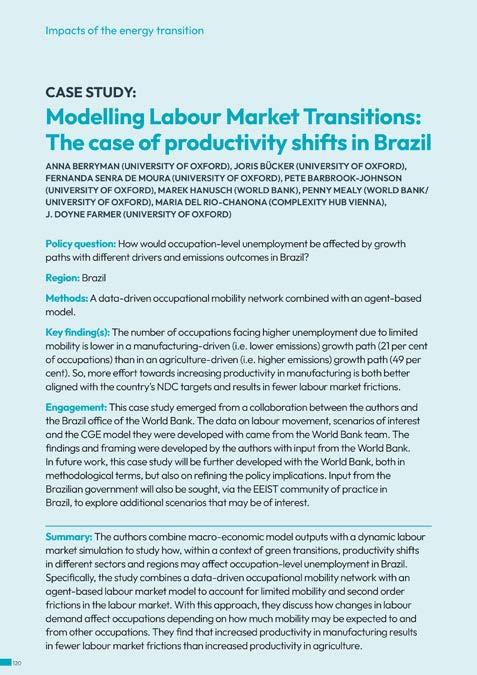
Case studies cover the global transition, and country-level studies on the power sector and industry, transport, agriculture, finance, and the impact of the transition. For example, analysis in this report suggests that, in Brazil, jobs and lower-emission development paths don’t have to be at odds with each other and in fact these development paths will likely help boost jobs. Other examples include: the macroeconomic impacts of achieving net zero in India by 2070, and the social consequences of the coal transition in China.
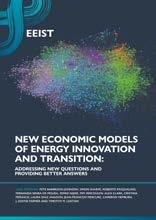
6
The future
Policy briefs
first supported the deployment of offshore wind, it generated around three times the market price. Few people guessed that within a would fall by 70 per cent, allowing offshore wind to provide electricity market price.
In order to engage with communities within its existing areas and reach new international audiences, EEIST is developing a number of topical policy briefs.
Its objectives are to:
capacity to apply this thinking and these models as part of the evolution of public policy in support of the energy transition. The work has built on and extended the strong foundations established in EEIST’s Communities of Practice.
aimed to deploy 20 GW of offshore wind in the UK by 2030. With the announcement last year Ten Point Plan for a Green Industrial Revolution, we doubled that target to 40 GW by 2030 –every home in the country. Meanwhile, the number of high-quality jobs supported by the industry and continues to grow.
1. Multiply the impact of EEIST’s findings;
The final reports
that progress in clean technologies has been faster than expected. The amount of solar power 2020 was over ten times higher than experts had forecast only fifteen years before. Similarly, the share of electric vehicles in global car sales continue to be revised radically upward. As we of the Paris Agreement within reach, and to maximise the benefits of the transition to net zero that we learn the lessons of these successes.

2. Increase the accessibility and influence of new solutions;
3. Provide practical advice on challenging policymaking decisions;
4. Provide input for events to stimulate debate on positive change.
Due towards the end of 2023, EEIST will publish a country report in each region that will summarise the findings, lessons learned and ongoing challenges in each area. These will be available on the website: eeist.co.uk

Government issued new guidance on policy appraisal in contexts of transformational change. This the future is uncertain, the aim of analysis is less to predict outcomes precisely, and more to find – places where a small intervention can have a large effect. I am delighted that researchers from and Brazil are working together to deepen our understanding of where such leverage points for change can be found, and to apply this to addressing climate change and ecosystem degradation, our challenge.
The legacy of EEIST
The project is designing and delivering bespoke programmes of workshops and training courses in India, China and Brazil, which will create a lasting legacy for the EEIST project. The sessions aim to inform a wide audience (including academics, thinktanks and policymakers) about a range of different modelling approaches, in order to ultimately build
Visit the website to see more details on the project’s work and future findings or to subscribe to the newsletter: eeist.co.uk
Energy Agency has estimated that without international collaboration, the transition to net zero global delayed by decades. On the other hand, if we work together, we can innovate faster, realise larger and create stronger incentives for investment. As countries of the world come together at COP26, this positive vision. With determined action and sustained collaboration, we can create new opportunities while securing a safe climate for the future.
Follow us:
IS A SOLAR FUTURE INEVITABLE? HOW TO SHAPE POLICIES TO CAPTURE THE OPPORTUNITIES OF CHEAP SOLAR FEMKE J.M.M. NIJSSE *, JEAN-FRANCOIS MERCURE NADIA AMELI FRANCESCA LAROSA SUMIT KOTHARI HECTOR POLLITT JAMIE RICKMAN SIMON SHARPE PIM VERCOULEN EEIST POLICY BRIEF SERIES EEIST partnership
7
EeistP company/eeist-project
Foreword
Nick Bridge
Foreign Secretary's Special Representative for Climate Change Foreign, Commonwealth & Development Office
Economics of Energy Innovation and System Transition

The EEIST project develops cutting-edge energy innovation analysis to support government decision making around low-carbon innovation and technological change. By engaging with policymakers and stakeholders in Brazil, China, India, the UK and the EU, the project aims to contribute to the economic development of emerging nations and support sustainable development globally.
Funders: EEIST is jointly funded through UK Aid by the UK Government Department for Energy Security & Net Zero, and the Children’s Investment Fund Foundation (CIFF). The contents of this document represent the views of the EEIST team, and should not be taken to represent the views of the UK government, CIFF or the organisations to which the authors are affiliated, or of any of the sponsoring organisations.

Find out more at: eeist.co.uk
All documents can be found online here: eeist.co.uk/eeist-reports
EEIST
EEIST
2023IIB045















